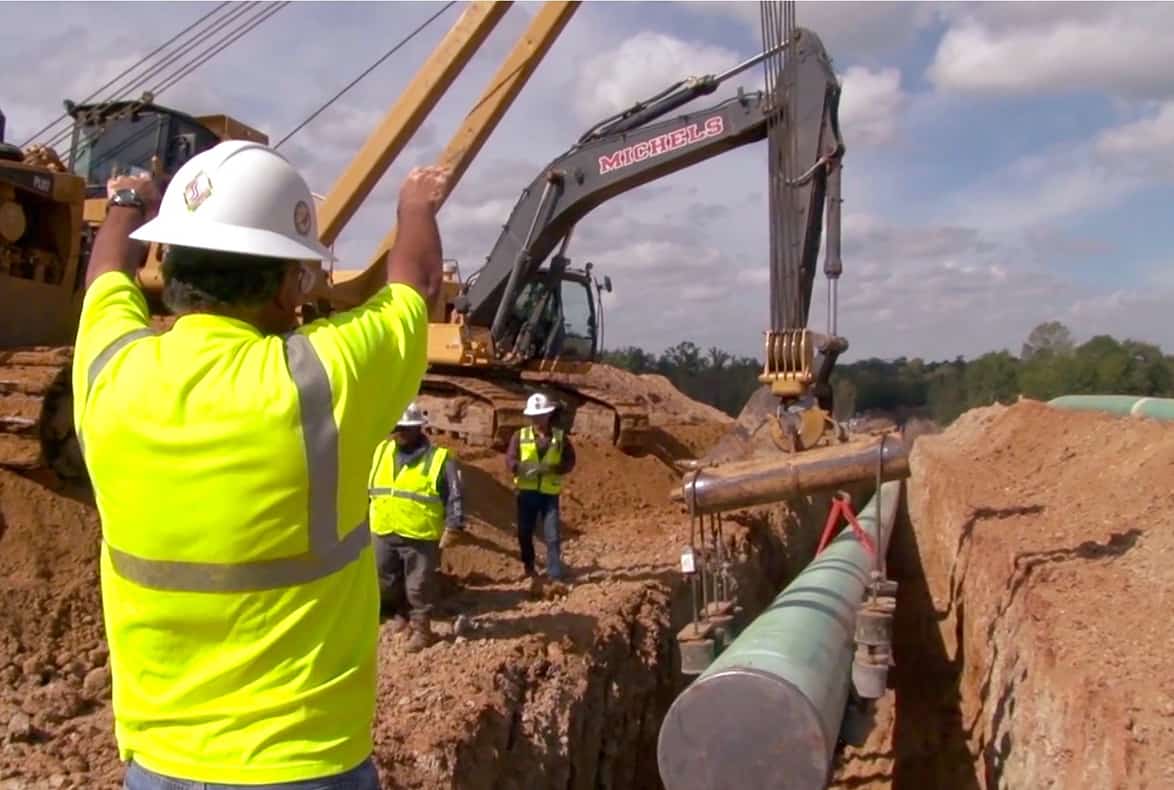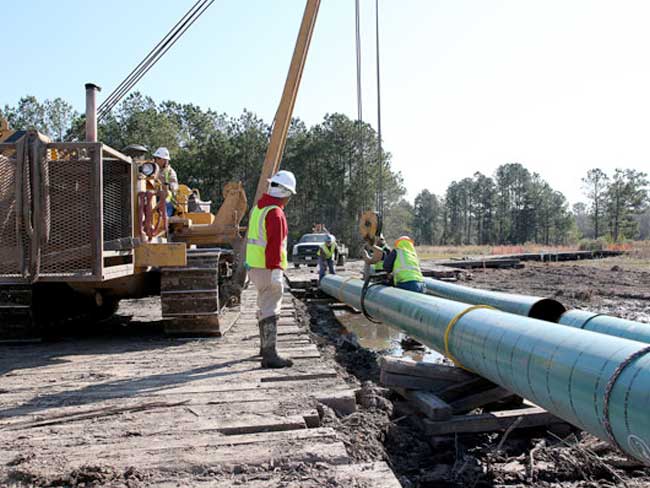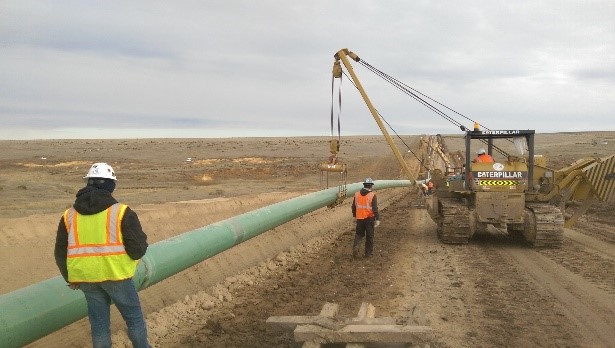When Creek Pipe local contractor ensures safety standards
Understanding the Trick Features of Pipeline Providers and Their Influence on Effectiveness
Pipeline services play an essential role in various sectors, influencing operational performance noticeably. Trick attributes, such as sophisticated monitoring modern technologies and maintenance techniques, are important for lessening downtime. Additionally, regulatory compliance guarantees safety and security and environmental defense. Nonetheless, the interaction in between style, facilities, and financial factors can make complex these processes. Understanding just how these elements effect overall efficiency raises vital questions concerning ideal practices and future developments in the area.
The Duty of Modern Technology in Pipeline Monitoring
As developments in modern technology remain to develop, the significance of reliable pipe tracking has actually become increasingly evident. Modern pipeline systems rely upon advanced monitoring devices that enhance functional performance and security. Technologies such as real-time information analytics, sensing units, and drones give drivers with instant insights right into pipe conditions, allowing them to detect leaks, corrosion, and other potential issues before they rise into considerable troubles.
The combination of Web of Things (IoT) devices has actually transformed conventional tracking techniques, allowing for constant security and automated coverage. This proactive approach not just lessens dangers but likewise enhances maintenance timetables and resource allowance. In addition, progressed software program systems assist in data visualization and analysis, equipping decision-makers to react quickly to abnormalities. Jointly, these technological developments not just enhance pipe honesty yet additionally foster environmental stewardship by minimizing the possible influence of leakages and spills.
Maintenance Methods for Enhanced Effectiveness
Reliable upkeep methods are necessary for enhancing pipeline effectiveness. Carrying out anticipating upkeep methods, sticking to regular inspection protocols, and developing robust emergency situation response plans can greatly boost functional integrity. These methods not just reduce downtime however additionally add to the overall safety and stability of pipeline systems.
Anticipating Upkeep Methods
Predictive upkeep techniques are increasingly recognized for their capability to improve functional performance in pipeline services. By leveraging data analytics and keeping track of technologies, these techniques allow drivers to prepare for tools failures prior to they occur. This aggressive technique minimizes unintended downtime, lowers upkeep prices, and extends the life expectancy of crucial possessions. Sensors and IoT tools play a critical duty in collecting real-time data, permitting the assessment of equipment wellness and performance trends. Equipment knowing algorithms assess this information to determine patterns and predict possible problems. Pipeline drivers can set up upkeep activities during non-peak times, optimizing resource appropriation and making certain continuous operation. Ultimately, the adoption of anticipating upkeep cultivates an extra dependable and effective pipeline infrastructure.

Routine Examination Protocols
Routine examination protocols function as a foundation of maintenance methods focused on boosting performance in pipe procedures - Midland oilfield pipeline services. These protocols entail systematic evaluations of pipeline integrity, concentrating on identifying possible concerns before they intensify. Normal examinations usually consist of visual analyses, leakage discovery modern technologies, and pressure monitoring to assure peak efficiency. By sticking to well established timetables, drivers can recognize deterioration, product wear, or obstruction, thereby lessening downtime and repair expenses. Additionally, information gathered throughout examinations can inform predictive upkeep efforts, enabling for a proactive approach to pipe management. Ultimately, regular evaluations not just prolong the life-span of pipeline framework but additionally add to safer and a lot more reliable transportation of resources, reinforcing total operational efficiency
Emergency Situation Reaction Preparation
Emergency reaction preparation is vital for keeping performance in pipeline procedures, making certain that drivers are prepared to address unpredicted cases promptly and successfully. A well-structured emergency feedback plan includes clear procedures, marked functions, and interaction techniques to mitigate risks related to pipeline failures. Regular drills and training boost team readiness and acquaint employees with emergency situation treatments. Additionally, having conveniently offered sources, such as spill control equipment and emergency situation contact listings, can greatly reduce feedback times. By incorporating real-time tracking modern technologies, operators can quickly determine and respond to problems, minimizing ecological influence and functional downtime. Eventually, an extensive emergency response plan not just safeguards properties and employees however additionally reinforces the general performance of pipe services.
Governing Conformity and Safety Standards
Regulatory compliance and safety standards play an important duty in the pipe solutions market. Midland oilfield pipeline services. Sticking to industry guidelines ensures that companies apply reliable safety and security procedures and risk administration strategies. This dedication not just protects workers and the atmosphere but also improves overall operational performance
Compliance With Market Rules
Compliance with industry policies is essential for ensuring the safety and effectiveness of pipeline procedures. Regulatory frameworks, such as those established by the Epa (EPA) and the see here now Pipeline and Hazardous Products Safety Administration (PHMSA), set stringent standards that operators need to follow. These policies cover different aspects, including pipe style, building, upkeep, and surveillance, assuring that systems run safely and properly. Non-compliance can result in extreme penalties, functional delays, and environmental risks. By adhering to these laws, pipe firms not only safeguard public safety and security and the setting yet additionally boost their operational efficiency. Ultimately, governing compliance fosters depend on amongst stakeholders, making certain that pipe solutions can run effortlessly in a competitive landscape while fulfilling legal commitments.

Security Procedure Implementation
Reliable safety and security procedure implementation is an essential element of pipe operations, closely linked to regulative conformity and safety and security standards. Sticking to these protocols not only assures the defense of workers yet additionally safeguards the setting and facilities. A robust security framework consists of regular training, extensive examinations, and the use of suitable safety devices. Organizations should stay alert in updating their methods to show adjustments in guidelines and technological innovations. Conformity with established safety requirements reduces the threat of crashes and enhances operational efficiency. In addition, a culture of safety fosters worker involvement and accountability, contributing to overall business success. Eventually, efficient safety protocol application is vital in preserving the stability of pipe services and accomplishing long-term sustainability in operations.
Danger Monitoring Strategies
Applying robust threat monitoring techniques is important for ensuring that pipeline operations stick to regulative demands and safety and security standards. Organizations must determine prospective hazards and assess risks connected with pipeline activities. This includes carrying out extensive evaluations, utilizing advanced monitoring modern technologies, and maintaining conformity with market policies. Routine training for employees on security methods enhances situational awareness and prepares teams to react efficiently to emergency situations. Additionally, establishing contingency strategies and performing drills can greatly minimize dangers. Collaborating with governing bodies ensures positioning with progressing security criteria. By prioritizing danger monitoring, pipe services can enhance operational efficiency while protecting both the environment and public safety and security. Inevitably, an aggressive method to risk monitoring cultivates a culture of security within the sector.
Pipeline Layout and Infrastructure Considerations
Just how can the layout and facilities of pipelines affect total operational performance? The configuration of pipelines plays a vital function in determining their effectiveness. Reliable layout reduces friction losses, hence lowering energy usage during liquid transportation. Elements such as size, material option, and format directly impact circulation prices and maintenance needs.
Additionally, critical positioning of valves and monitoring systems boosts functional control and safety and security. Midland oilfield pipeline services. Infrastructure considerations, including availability for repair and maintenance, significantly affect downtime and general performance
Moreover, incorporating advanced technology for real-time surveillance assists in prompt detection of leaks or ineffectiveness, making sure quick feedbacks to issues. The total architectural honesty, influenced by product resilience and ecological factors, also forms pop over to this site long-term functional success. As a result, thoughtful design and robust facilities are essential for making the most of pipeline effectiveness, inevitably adding to the integrity and success of pipe services.
Environmental Impact and Sustainability Practices
While the need for pipe services continues to grow, recognizing the ecological effect and taking on sustainability practices has become significantly necessary. The construction and operation of pipelines can notably affect environments, wild animals environments, and water resources. To mitigate these influences, companies are carrying out advanced modern technologies and methods focused on decreasing emissions, protecting against spills, and decreasing land interruption.
Sustainability efforts usually include using environmentally pleasant materials, enhancing energy performance, and employing renewable resource sources to power operations. Additionally, business are significantly performing thorough environmental analyses prior to project initiation, ensuring conformity with guidelines and stakeholder involvement.

Price Administration and Financial Consider Pipeline Providers
As the pipe industry grows, efficient price management and comprehending financial variables come to be essential for maintaining competition. Companies deal with numerous economic pressures, including varying product prices, labor expenses, and regulatory compliance charges. To browse try here these challenges, pipeline company should take on calculated economic planning and budgeting techniques.
Purchasing technology can enhance operational performance, inevitably reducing prices in time. Furthermore, efficient task monitoring guarantees that resources are assigned efficiently, lessening hold-ups and unforeseen costs.

Market conditions, such as demand for power and geopolitical variables, also affect economic viability. Companies have to stay nimble, readjusting their techniques in response to these external aspects.
Often Asked Concerns
What Are the Different Kinds Of Pipeline Solutions Available?
Various kinds of pipe services include transport, storage space, maintenance, assessment, and repair service. Each service plays an essential duty in making sure the seamless activity of materials, enhancing safety and security, and minimizing operational disturbances across different industries.
How Commonly Should Pipeline Inspections Be Performed?
Pipeline inspections ought to be carried out routinely, usually each to three years, depending upon the kind and condition of the pipe. Much more regular examinations might be necessary for older or high-risk pipelines to guarantee safety and security and integrity.
What Are the Main Causes of Pipeline Failings?
The major root causes of pipe failings include corrosion, damaged building, material flaws, outside damage, leakages, and operational mistakes. Each variable adds considerably to possible risks, highlighting the relevance of routine maintenance and tracking for security.
How Can Firms Boost Pipeline Solution Dependability?
Business can improve pipeline service dependability by carrying out routine maintenance timetables, making use of advanced tracking innovations, carrying out thorough assessments, investing in staff member training, and adopting proactive danger monitoring methods to anticipate and minimize potential failures.
What Function Do Operators Play in Pipeline Services?
Operators play an essential duty in pipeline services by ensuring risk-free transportation, preserving tools, monitoring system stability, working with maintenance, and responding to emergencies. Their knowledge straight influences operational performance and decreases disturbances in solution distribution.